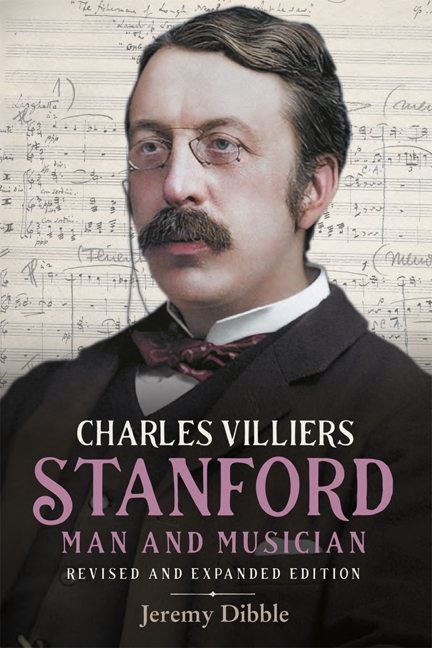Book contents
- Frontmatter
- Dedication
- Contents
- List of Illustrations
- List of Music Examples
- List of Analytical Tables
- Preface and Acknowledgements
- Supplementary Introduction to the Revised and Expanded Edition
- List of Sigla and Abbreviations
- I Early Influences and Impressions, 1852–70
- II Formative Years, 1870–87
- III Recognition, 1888–1901
- IV The New Generation, 1901–14
- V War and Decline, 1914–24
- Appendix: List of Works
- Select Bibliography
- Index of Works
- General Index
- Irish Musical Studies Previous volumes
6 - The Cambridge Professorship: Reform and International Acclaim (1888–92)
Published online by Cambridge University Press: 12 May 2024
- Frontmatter
- Dedication
- Contents
- List of Illustrations
- List of Music Examples
- List of Analytical Tables
- Preface and Acknowledgements
- Supplementary Introduction to the Revised and Expanded Edition
- List of Sigla and Abbreviations
- I Early Influences and Impressions, 1852–70
- II Formative Years, 1870–87
- III Recognition, 1888–1901
- IV The New Generation, 1901–14
- V War and Decline, 1914–24
- Appendix: List of Works
- Select Bibliography
- Index of Works
- General Index
- Irish Musical Studies Previous volumes
Summary
Debate about reform of the Professorship of Music had taken place ten years earlier, in 1877, when a report of the Board of Musical Studies ‘considered it would be extremely beneficial if the Professor should reside for a period of (or periods equivalent to) not less than one term in each academic year, and thus take a more continuous and systematic part in the musical teaching of the University.’ It was thus recognised that an increase in the annual stipend would be necessary, ‘the present stipend being wholly insufficient to compensate a first rate musician, not already located in Cambridge, for the loss of professional income which such residence would involve.’ Yet, within a fortnight of Macfarren's death, recommendations were made to Senate that the fundamental conditions of the Professorship in Music would remain unchanged, even though it was evident from the Cambridge Reporter that the present position was unsatisfactory. Senate was advised, however, that it was an unfavourable time to place increased financial demands on the University chest, and so the post was advertised with the usual exemption from residence and no increase in the present stipend. Four candidates were short listed: Dr George Garrett (organist of St John's College), Edwin. M. Lott (organist of St Sepulchre's Church), Ebenezer Prout (Guildhall School of Music) and Stanford. From the panel of nine electors, who were all present, all votes were given for Stanford who was duly elected on 7 December 1887. The declaration of office and admission to the post were effected in the presence of the Vice-Chancellor and Registrar the following day. As Professor of Music, Stanford wished to be admitted as soon as possible to the degree of Doctor of Music. At Senate it was agreed as a matter of formality that the usual examinations and exercises for musical degrees be waived, but it was nevertheless proposed that Stanford should be admitted first to the Bachelor of Music and then to the degree of ‘Doctor Designate’. This course of action was, however, withdrawn at Stanford's request, and instead he was admitted as Doctor of Music honoris causa on 8 November 1888.
The beginning of January 1888 was marred by the sad news of the death of Marian Jenkinson, Jennie Stanford's youngest sister (the fifth daughter of Champion Wetton). In 1887 she had married Francis Jenkinson but the union only lasted a mere four months.
- Type
- Chapter
- Information
- Charles Villiers StanfordMan and Musician, pp. 223 - 283Publisher: Boydell & BrewerPrint publication year: 2024



